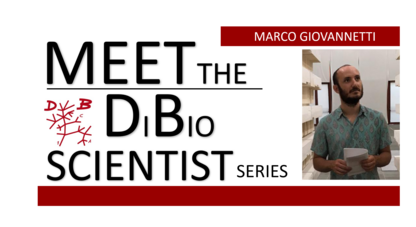
MEET THE DIBIO SCIENTIST SERIES : Marco Giovannetti
Pubblicato il: 14.10.2020 09:36
Marco is an early career researcher (RTDa) at DiBio
Can you summarize in few words your research?
I work with the hidden side of plant development trying to investigate how roots modulate their growth responding to biotic and abiotic stimuli. In particular I try to understand the genetic and molecular base of absorption and sensing of phosphate within root cells. Phosphate is one of the main limiting factors for plant growth and plants have evolved different strategies to get it from the soil, where the phosphate is not so much available. One of the most successful strategies has been the establishment of a long-lasting symbiosis with soil fungi, called arbuscular mycorrhizal symbiosis. In my research I investigate the evolutionary aspects of plant phosphate uptake with a special focus on natural variation in different plant species.
What is the most rewarding and the most challenging part of your work?
I love making hypotheses about how things can be working and which could be the reasons behind it. I feel so lucky that our job allows us to keep learning, exploring the darkness of knowledge and teaching but it also requires the capacity of dealing with a great dose of frustration: things always take longer than planned, we face so many delusions and I often deal with the impostor syndrome.
Tell us your story: what brings you to DiBio?
I’m originally from Torino and that’s where I’ve been studying, doing my PhD and a first short postdoc. Then I decided to move to Vienna, where I spent 4 beautiful years in a vibrant scientific environment and in a city with a really high quality of life. At the end of my postdoc I was lucky enough to have the chance of coming to Padova. This choice represents a great balance between quality of science, life standards and possibility of being closer to my family. And speaking dialect from here is still easier than German.
What’s your favourite “toy” for research – and what can it do?
Evolution. That’s my favourite toy! Organisms that we are working with have been constantly evolving and their genomes have been shaped responding to so many different selection pressures. Digging natural variation and trying to demonstrate their functional link is what I like the most.
What are your interests outside science?
I have plenty of interests outside of science: I love reading, going to the cinema, cooking, going to museums and bouldering. But these was before. Then I had a beloved daughter that it my main occupation if I’m not working.





